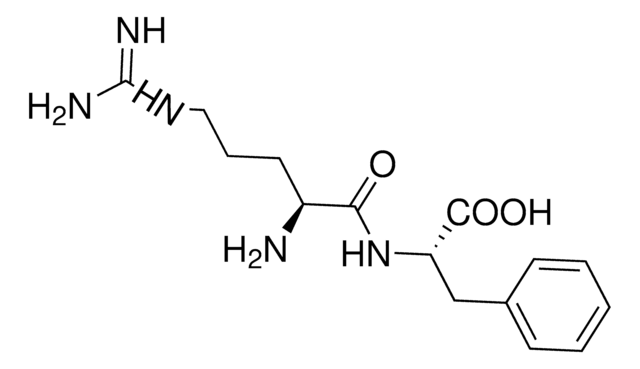M3129
Met-Gly
≥98% (TLC)
Se connecterpour consulter vos tarifs contractuels et ceux de votre entreprise/organisme
About This Item
Formule empirique (notation de Hill):
C7H14N2O3S
Numéro CAS:
Poids moléculaire :
206.26
Numéro CE :
Numéro MDL:
Code UNSPSC :
12352202
ID de substance PubChem :
Nomenclature NACRES :
NA.26
Produits recommandés
Nom du produit
Met-Gly,
Essai
≥98% (TLC)
Niveau de qualité
Forme
powder
Couleur
white
Température de stockage
−20°C
Chaîne SMILES
OC(CNC([C@@H](N)CCSC)=O)=O
InChI
1S/C7H14N2O3S/c1-13-3-2-5(8)7(12)9-4-6(10)11/h5H,2-4,8H2,1H3,(H,9,12)(H,10,11)/t5-/m0/s1
Clé InChI
QXOHLNCNYLGICT-YFKPBYRVSA-N
Actions biochimiques/physiologiques
Met-Gly is a dipeptide.
Code de la classe de stockage
11 - Combustible Solids
Classe de danger pour l'eau (WGK)
WGK 3
Point d'éclair (°F)
Not applicable
Point d'éclair (°C)
Not applicable
Faites votre choix parmi les versions les plus récentes :
Déjà en possession de ce produit ?
Retrouvez la documentation relative aux produits que vous avez récemment achetés dans la Bibliothèque de documents.
Urszula Rychlewska et al.
Acta crystallographica. Section C, Crystal structure communications, 66(Pt 2), m51-m54 (2010-02-04)
Crystallographic analysis of a solid solution of two diastereoisomers, i.e. ({(1S,R)-1-carboxy-3-[(R,S)-methylsulfinyl]propyl}aminocarbonyl)methanaminium tetrachloridoaurate(III) and ({(1S,R)-1-carboxy-3-[(S,R)-methylsulfinyl]propyl}aminocarbonyl)methanaminium tetrachloridoaurate(III), (C(7)H(15)N(2)O(4)S)[AuCl(4)], has shown that in the presence of gold(III), the methionine part of the Gly-D,L-Met dipeptide is oxidized to sulfoxide, and no coordination to the
Justin Kai-Chi Lau et al.
Journal of the American Society for Mass Spectrometry, 24(4), 543-553 (2013-02-27)
Radical cations [Met-Gly](•+), [Gly-Met](•+), and [Met-Met](•+) have been generated through collision-induced dissociation (CID) of [Cu(II)(CH3CN)2(peptide)](•2+) complexes. Their fragmentation patterns and dissociation mechanisms have been studied both experimentally and theoretically using density functional theory at the UB3LYP/6-311++G(d,p) level. The captodative structure
Olga B Morozova et al.
The journal of physical chemistry. B, 113(20), 7398-7406 (2009-05-15)
Time-resolved chemically induced dynamic nuclear polarization (CIDNP) was applied to the investigation of the photo-oxidation of two sulfur containing peptides, glycylmethionine (Gly-Met) and methionylglycine (Met-Gly). It was established that the reaction of Gly-Met with a photosensitizer, triplet 4-carboxybenzophenone, occurs via
J C Matthews et al.
Journal of animal science, 73(11), 3464-3475 (1995-11-01)
The absorption of carnosine, methionine, and methionylglycine (using 35S-methionine and 35S-methionylglycine as representative markers) across ruminal and omasal epithelia collected from four (carnosine) and seven sheep (methionine and methionylglycine) were studied using parabiotic chambers that were repeatedly sampled over a
Marija D Živković et al.
Bioorganic chemistry, 72, 190-198 (2017-05-02)
Two dinuclear palladium(II) complexes, [{Pd(en)Cl}
Notre équipe de scientifiques dispose d'une expérience dans tous les secteurs de la recherche, notamment en sciences de la vie, science des matériaux, synthèse chimique, chromatographie, analyse et dans de nombreux autres domaines..
Contacter notre Service technique








